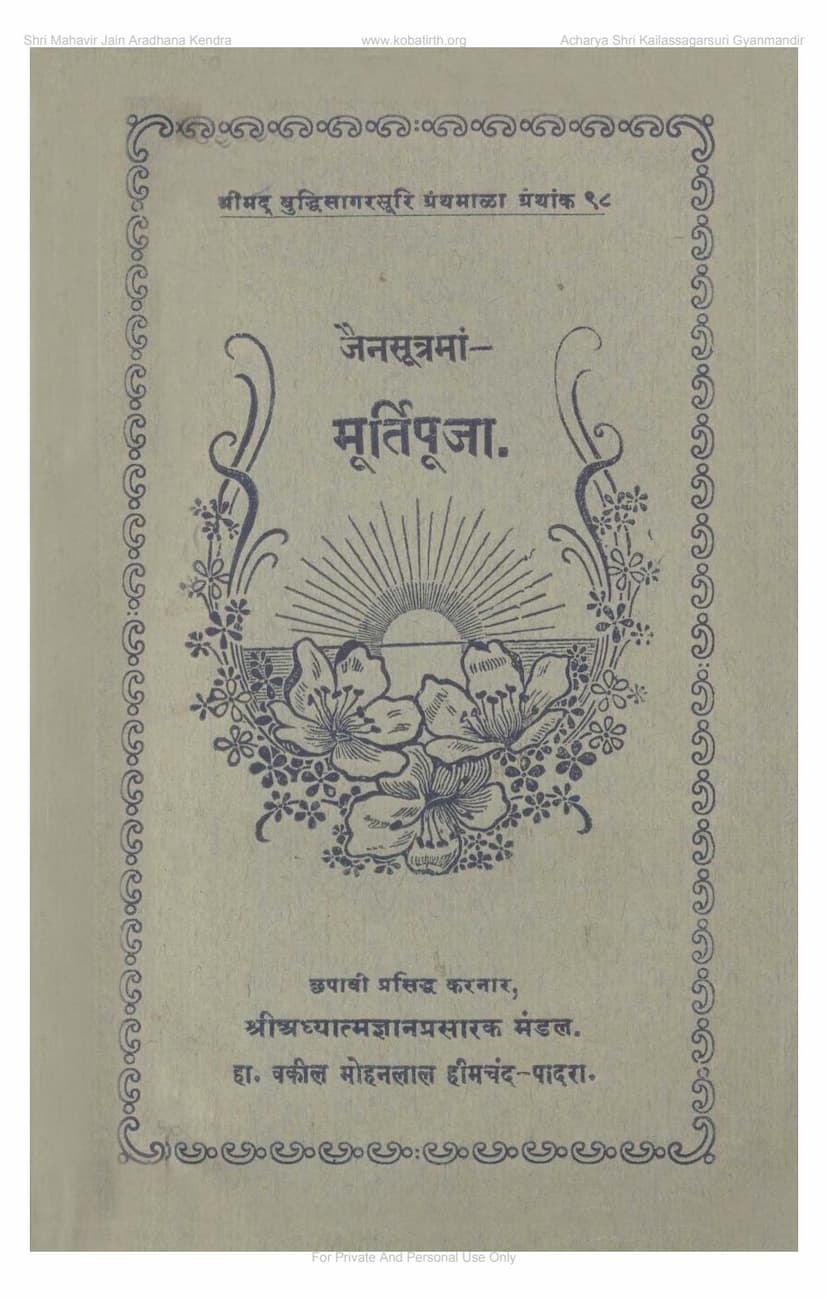Jainsutrama Murtipooja
Added to library: September 2, 2025

Summary
This document is a comprehensive treatise titled "Jainsutrama Murtipooja" (Idol Worship in Jain Sutras) by Acharya Shrimad Buddhisagar Suriji, published by Shri Adhyatma Gyan Prasarak Mandal. It addresses the controversial topic of idol worship within Jainism, aiming to demonstrate its scriptural validity and philosophical underpinnings.
Key Arguments and Content:
- Scriptural Basis: The book argues that Jain scriptures (Sutras) do, in fact, support and describe idol worship. It refutes the notion that Jain Agamas prohibit it, as propagated by some sections of the Shthanakvasi community.
- Historical Context: The author traces the history of idol worship, noting its prevalence across various religions like Hinduism, Islam, Christianity, Buddhism, and Parsism, suggesting that the human inclination towards venerating a form or symbol is universal due to love and devotion.
- The Nature of Love and Worship: The central theme is that love is the fundamental reason for worship. Where there is love for a person, deity, or principle, a form or representation (murti) is created and venerated. This veneration extends to various forms, including physical representations, scriptures, and even abstract concepts when imbued with love and devotion.
- Symbolic Representation: The book posits that idols are not mere objects but serve as symbolic representations of the Tirthankaras' virtues, ideals, and spiritual attainment. They act as focal points for contemplation, devotion, and emulation, helping devotees connect with the divine qualities.
- The Role of the Idol Worshipper (Shrवक): The author asserts that the responsibility of creating and worshipping idols lies primarily with the householder (Shravak) and not with the ascetic (Sadhu or Sadhvi). This distinction is crucial to understanding certain scriptural passages.
- Interpretation of Scriptural Passages: The book delves into interpretations of key passages from scriptures like the Mahanishith Sutra. It addresses specific examples, such as the story of Kamalaprabhacharya, to clarify that scriptural prohibitions apply to ascetics engaging in idol worship or temple construction, not to the practice itself as undertaken by lay followers. The author argues that the criticism is directed at the misuse or misinterpretation of these practices by those who deviate from their prescribed roles.
- Critique of Shthanakvasi Arguments: The book directly addresses and refutes the arguments of those who oppose idol worship, particularly referencing articles in the "Jain Hitachhu" magazine. It highlights perceived misinterpretations of the Mahanishith Sutra by these opponents.
- Spiritual Development: Idol worship is presented as a means for spiritual development. By meditating on the virtues embodied in the idols, devotees can cultivate similar qualities within themselves. The idols serve as reminders of the Tirthankaras' exemplary lives as householders and ascetics.
- Social and Economic Benefits: The author also touches upon the societal benefits derived from temple construction and idol creation, including the promotion of art, architecture, and the livelihood of artisans.
- Unity and Coexistence: The book advocates for unity among Jain sects, urging a move beyond divisive debates on idol worship. It emphasizes the need for a common approach to preserving and promoting Jainism in the modern era.
- The Life of Muni Vriddhisagarji: A significant portion of the book is dedicated to the biography of Muni Vriddhisagarji, a disciple of the author. His life story, characterized by devotion, study, and adherence to monastic vows, is presented as an exemplary life, reinforcing the author's broader message. Muni Vriddhisagarji's deep faith in idol worship and its role in his spiritual development is highlighted.
Overall Message:
"Jainsutrama Murtipooja" aims to reconcile the practice of idol worship with Jain scriptural teachings. It argues that idol worship, when understood and practiced correctly, is a valid and beneficial path for spiritual growth, rooted in love, devotion, and the emulation of Tirthankara ideals. The book encourages a balanced and scripturally informed approach, promoting understanding and unity within the Jain community.